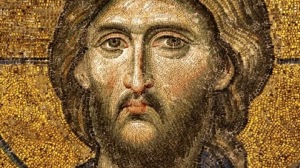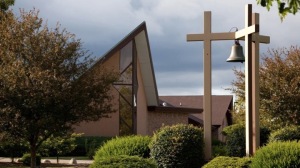“Now and Forever”
2 Corinthians 4:13 – 5:1
June 7, 2015, First Presbyterian Church of Holt
Listen to the sermon here
(audio picks up on the second paragraph)
 Anyone who’s stopped by the office the past month or so has seen Myra, Kirk, and I looking something like this. The irony was not lost on any of us as we were working frantically so that we could plan a church wide season of rest. In any given day my calendar was open to four months at a time, planning for the life of the church all the way into October.
Anyone who’s stopped by the office the past month or so has seen Myra, Kirk, and I looking something like this. The irony was not lost on any of us as we were working frantically so that we could plan a church wide season of rest. In any given day my calendar was open to four months at a time, planning for the life of the church all the way into October.
 And you know what? We’ve got a tremendous summer ahead of us, with great guest preachers, musicians, and opportunities to connect through prayer and mission. It really is going to be a memorable sabbatical season, and hopefully one that will allow each of us to refuel and connect on a deeper level with God’s plans for us as individuals and as a church.
And you know what? We’ve got a tremendous summer ahead of us, with great guest preachers, musicians, and opportunities to connect through prayer and mission. It really is going to be a memorable sabbatical season, and hopefully one that will allow each of us to refuel and connect on a deeper level with God’s plans for us as individuals and as a church.
 For me personally though, the tricky thing with all of this intensive planning of several months at the same time is when I would slow down, step back and try to answer a question about what day it was or even what month it was, it took me a minute. My mind was in October’s logistics, my heart was pondering our Wednesday night worship services, and my soul was in prayer for our Diving into Dreamin’ retreat. Needless to say, that all left me feeling a bit discombobulated.
For me personally though, the tricky thing with all of this intensive planning of several months at the same time is when I would slow down, step back and try to answer a question about what day it was or even what month it was, it took me a minute. My mind was in October’s logistics, my heart was pondering our Wednesday night worship services, and my soul was in prayer for our Diving into Dreamin’ retreat. Needless to say, that all left me feeling a bit discombobulated.
 Our text today the Apostle Paul gives us a similarly exciting and disorienting timeline: the excitement of the growing community of Christ in Paul’s midst, an ongoing feeling of his body wasting away, and an eternal hope in the heavens. It seems Paul also has his calendar open on many pages at a time. Perhaps that’s why Paul often looks stressed out in so many depictions of him.
Our text today the Apostle Paul gives us a similarly exciting and disorienting timeline: the excitement of the growing community of Christ in Paul’s midst, an ongoing feeling of his body wasting away, and an eternal hope in the heavens. It seems Paul also has his calendar open on many pages at a time. Perhaps that’s why Paul often looks stressed out in so many depictions of him.
 As Christians we are by definitions followers of Christ, a lived out example of what living in this sort of scheduling tension looks like: Christ was both fully God, everlasting and eternal, and fully human, living on a linear timeline, interacting with individual people in individual ways. Christ was embodied, living in a body that way not made to last forever. Christ was also a soul, an eternal and inseparable aspect of God. As Christians we are called then to live into this tension of the world to come and the world that is becoming.
As Christians we are by definitions followers of Christ, a lived out example of what living in this sort of scheduling tension looks like: Christ was both fully God, everlasting and eternal, and fully human, living on a linear timeline, interacting with individual people in individual ways. Christ was embodied, living in a body that way not made to last forever. Christ was also a soul, an eternal and inseparable aspect of God. As Christians we are called then to live into this tension of the world to come and the world that is becoming.
 Following Christ means living excitedly for the world that is to come, the kingdom of God and all of the joy and glory that will bring. But that doesn’t mean we disregard that which God has put before us today. God’s eternal Kingdom comes together from what happens in our immediacy just as the forest is both a forest all together and a collection of trees individually.
Following Christ means living excitedly for the world that is to come, the kingdom of God and all of the joy and glory that will bring. But that doesn’t mean we disregard that which God has put before us today. God’s eternal Kingdom comes together from what happens in our immediacy just as the forest is both a forest all together and a collection of trees individually.
There’s an old story about a disciple and his teacher. “Where shall I find God?” a disciple once asked. “Here,” the teacher said. “Then why can’t I see God?” ”Because you do not look.” “But what should I look for?” the disciple continued.“ Nothing. Just look,” the teacher said. “But at what?” “At anything your eyes alight upon,” the teacher said. “But must I look in a special kind of way?” “No, the ordinary way will do.” “But don’t I always look the ordinary way?” “No, you don’t,” the teacher said. “But why not?” the disciple pressed. “Because to look, you must be here. You’re mostly somewhere else,” the teacher said. [1]
In order to do the work of God we must be present to God’s movement in, through, and among us. We must live firmly in the tension of the big picture of God’s kingdom, and God’s kingdom work close-up, which can look a lot like… nothing in particular.
 A frequent prayer of mine when thinking about all the day to day work that we do as a session, as deacons, and as a church all together, is that our right-here-right-now to-do lists may reflect God’s eternal purposes. What we do in the here and now can contribute towards that which is eternal, which is God’s heavenly kingdom.
A frequent prayer of mine when thinking about all the day to day work that we do as a session, as deacons, and as a church all together, is that our right-here-right-now to-do lists may reflect God’s eternal purposes. What we do in the here and now can contribute towards that which is eternal, which is God’s heavenly kingdom.
The reason I pray this so often is because wrapping my own mind around the tension of working towards both now and forever is really challenging. I’d love to know in this instant all the goodness that will come out of the work that we do this summer: the inspiration drawn from the Divin’ into Dreaming Retreat, the lives impacted by our youth in Chicago, the connections we make to our community through our Vacation Bible School. It’d be great to know the sweeping impact that this congregation will have over the next 5 years or 50 or 150. But in the meantime, I’ll be here, to experience life with you, to walk beside you, and to do all that I can to make God’s priorities my priorities.
 As Paul exhorts us to follow him in believing in Jesus Christ, he also appeals to us to speak from that belief. Paul affirms that our bodies are not built to live forever, but our souls are. And as long as these are temporary bodies of ours hold out, we are called to work in our immediacy, pointing others towards the Kingdom of God which is eternal. May we be bold enough to do as Paul did: first believing and then speaking the good news of the Gospel. Amen.
As Paul exhorts us to follow him in believing in Jesus Christ, he also appeals to us to speak from that belief. Paul affirms that our bodies are not built to live forever, but our souls are. And as long as these are temporary bodies of ours hold out, we are called to work in our immediacy, pointing others towards the Kingdom of God which is eternal. May we be bold enough to do as Paul did: first believing and then speaking the good news of the Gospel. Amen.
[1] Bartlett, David Lyon, and Barbara Brown Taylor. Feasting On the Word. 12 vols. Preaching the Revised Common Lectionary. Louisville: Westminster John Knox Press, 2008-2011.






